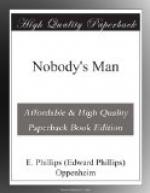“Well, what was the final result of your efforts towards companionship?” she enquired, after they had praised the chicken enthusiastically and the wave of service had momentarily ebbed kitchenwards.
“They have led me to only one conclusion,” he answered swiftly.
“Which is?”
“That if you remain on Exmoor and I in Westminster, the affairs of this country are not likely to prosper.”
She laughed softly.
“As though I made any real’ difference!”
Then she saw a transformed man. The firm mouth suddenly softened, the keen bright eyes glowed. A light shone out of his worn face which few had ever seen there.
“You make all the difference,” he whispered. “You of your mercy can save me from the rocks. I have discovered very late in life, too late, many would say, that I cannot build the temples of life with hands and brain alone. Even though the time be short and I have so little to offer, I am your greedy suitor. I want help, I want sympathy, I want love.”
There was nothing whatever left now of Lady Jane of Woolhanger. Segerson would probably not have recognised his autocratic mistress. The most timid of her tenant farmers would have adopted a bold front with her. She was simply a very beautiful woman, trembling a little, unsteady, nervous and unsure of herself.
“Oh, I wish you hadn’t said that!” she faltered.
“But I must say it,” he insisted, with that alien note of tenderness still throbbing in his tone. “You are not a dabbler in life. You have never been afraid to stand on your feet, to look at it whole. There is the solid, undeniable truth. It is a woman’s glory to help men on to the great places, and the strangest thing in all the world is that there is only one woman for any one man, and for me—you are the only one woman.”
Around them conversation had grown louder, the blue cloud of tobacco smoke more dense, the odour of cigarettes and coffee more pungent. Down in the street a wandering musician was singing a little Neapolitan love song. They heard snatches of it as the door downstairs was opened.
“You have known me for so short a time,” she argued. “How can you possibly be sure that I could give you what you want? And in any case, how could I give anything except my eager wishes, my friendship—perhaps, if you will, my affection? But would that bring you content?”
“No!” he answered unhesitatingly. “I want your love, I want you yourself. You have played a woman’s part in life. You haven’t been content to sit down and wait for what fate might bring you. You have worked out your own destiny and you have shown that you have courage. Don’t disprove it.”
She looked him in the eyes, very sweetly, but with the shadow of a great disturbance in her face.
“I want to help you,” she said. “Indeed, I feel more than you can believe—more than I could have believed possible—the desire, the longing to help. But what is there you can ask of me beyond my hand in yours, beyond all the comradeship which a woman who has more in her heart than she dare own, can give?”




